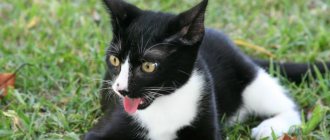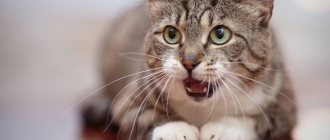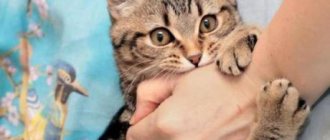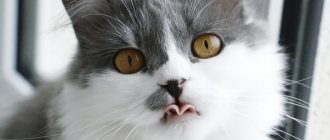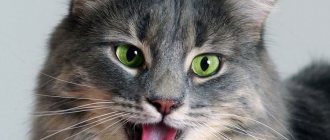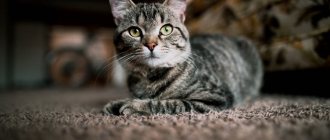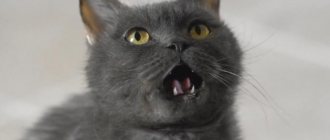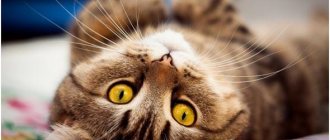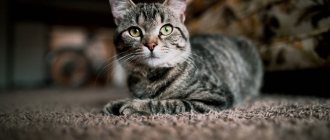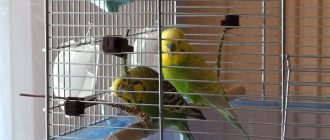You may be concerned when your cat first begins to mouth breathe. It's normal to be concerned about your cat's mouth breathing, but the first question you may want to ask yourself is whether she is mouth breathing or acting differently. So, can cats breathe through their mouths?
Cats can breathe through their mouths, but this is not normal behavior. Cats should breathe smoothly and for a long time through their nose. Blocked nasal passages or serious medical conditions can lead to mouth breathing.
Don't worry. This article will explain why your cat may be mouth breathing, what you can do to help, and why your cat may start mouth breathing. Of course, since mouth breathing can be caused by some pretty serious health problems, if you're ever concerned about your cat's mouth breathing, you should contact your veterinarian immediately.
Why does a cat breathe through its mouth?
There are many reasons why your cat may start mouth breathing, although it is almost always a sign that something is wrong. Some problems are fairly easy to fix, such as your cat becoming overexerted while playing, while other problems may mean you need to see a veterinarian immediately.
© shutterstock
Here are some common (mild) reasons why your cat may start mouth breathing:
- Allergies (especially in spring or autumn)
- Intense exercise
- Asthma
- Old age (especially in combination with any other factor)
- Respiratory infections
With the exception of respiratory infections, all of these problems should be relatively easy to identify. If your cat has asthma, you must monitor her closely to prevent a mild attack from developing into a more serious problem.
If your cat has been playing too hard and is panting, you should stop playing and give her some time to relax and recover. See if your cat is interested in water or ice to help cool him down.
Allergies are more difficult to manage, but your cat can get better if you have an air filter. If your cat's allergies become more severe, you should take her to the vet to see what treatment options may be available.
If you don't think any of these options are the cause, you may be dealing with a more serious problem. There are many problems that can cause your cat to start mouth breathing, from a severe respiratory infection to a foreign body, throat or stomach damage, and a severe asthma attack.
The cause is less important than going to the vet for any of these problems. Your veterinarian will be able to diagnose and treat the problem much more effectively than you can.
When is a vet visit necessary?
If you have certain symptoms, it is better not to waste time on self-examination. These include:
- rapid deterioration of the condition or lack of improvement within 3 hours;
- severe wheezing and gurgling in the chest;
- the appearance of pain when touching or coughing, accompanied by a plaintive meow;
- copious discharge of mucus from the nose or mouth;
- pale or blue discoloration of the skin and mucous membranes;
- increase or decrease in heart rate;
- convulsions;
- loss of consciousness.
Particular attention should be paid to children, elderly and pregnant animals. If the kitten is breathing heavily, then it should be taken to the veterinary clinic even in the absence of the listed symptoms. Due to fragile immunity, pets often get sick with complications up to a year old, so in such a situation it is better to play it safe.
In addition to visual inspection and palpation (palpation), a blood test, ultrasound, x-ray and ECG may be required to make a diagnosis. The list of medications will depend on the pathology found:
- antibiotics and antivirals that fight infectious agents;
- anthelmintics that destroy parasites;
- cardiotonics and vasopressors, which reduce the volume of circulating blood and increase the force of heart contraction;
- diuretics, facilitating the removal of excess fluid;
- glucocorticosteroids, eliminating allergies and inflammatory processes;
- sorbents that stimulate the removal of toxins.
In case of poisoning, an antidote may be required. Surgery is used when injuries, deep-lying foreign bodies and neoplasms are detected. If at the time of treatment the cat is in serious condition, then it can be placed in an oxygen chamber.
How to tell if your cat has breathing problems
Your cat's mouth breathing may be a sign that she is having trouble breathing, but this is not always the case. For example, if your cat breathes through her mouth after playing and then starts breathing normally a few minutes later, she doesn't have a breathing problem. They just needed some oxygen for a few minutes.
But if your cat is acting strange, laying down and doesn't want to move, or has glazed eyes when breathing through its mouth, it probably has trouble breathing.
You should also check their gums and tongue to make sure they haven't changed color. Both should be a healthy pink color, but may turn gray or blue if your cat is having trouble breathing. If you notice that your cat's gums or tongue have started to change color, you need to take them to the vet as soon as possible.
Language functions
To understand why a cat sticks out its tongue, you first need to understand what functions this muscular organ performs. A cat's tongue performs a number of important functions:
- helps in the process of swallowing, nutrition;
- allows you to recognize the taste of food;
- allows for hygiene procedures.
In its normal state, the tongue is located in the mouth. But there are times when the owner complains that the cat constantly sticks his tongue out. But this phenomenon is not always considered pathological. There are also physiological reasons why a cat sticks out the tip of its tongue.
Why does a cat open his mouth?
Just because your cat's mouth is open does not mean she is mouth breathing. Make sure your cat's belly heaves when her mouth is open. They are probably mouth breathers anyway.
But sometimes a cat opens its mouth randomly, and sometimes leaves it open for a while before closing it.
Typically, when a cat leaves its mouth open, it is because it smells something interesting and is trying to get more of that smell in order to identify it. Your cat has important scent glands in her mouth, so opening her mouth helps carry scents to her most sensitive organs.
If you've ever seen a cat react to wings, where they open their mouth wide and make strange facial expressions, this is a more exaggerated form of smelling the air with these important scent glands.
© shutterstock
Physiological reasons
Sometimes a protruding tongue is explained by simple physiology. In these cases there is nothing to worry about.
Washing
You can often see a cat sitting with its tongue hanging out after a long wash. Perhaps this is how she relaxes her muscles or meditates.
Relaxation
When a cat sleeps, the muscles of the tongue are relaxed and it naturally lengthens. Therefore, the animal’s mouth is half open and the tip of this muscular organ protrudes from it.
Stressful situations
Many animals, when in an excited state, are characterized by rapid breathing. The protruding tongue facilitates the passage of oxygen to the respiratory tract.
Overheat
Both dogs and cats, when they are hot, breathe heavily with their tongues hanging out. And this is a physiological norm - this is how they cool down. After all, they have practically no sweat glands; a small amount of them is located only on the pads of their paws.
Sexual rut
A protruding tongue can be seen in a male when he is excitedly “courting” a female, and this is also considered a physiological norm.
Childbirth
During the birth of kittens, the cat breathes heavily, constantly licks itself, forgetting to remove its tongue. At this point in her life, this is an absolutely normal sign, as she is very tense, tired, and may have a fever.
Nausea
Some pets get motion sickness from riding in a car. A sign of impending nausea and vomiting can be the tip of the tongue sticking out of the mouth.
The same situation occurs with a pet after anesthesia, for example, after sterilization or castration. But here general muscle weakness joins nausea.
Sounds
A certain frequency of vibration of sound waves causes reflex yawning and the effect of protruding the tongue in cats. For example, if you run your finger over the teeth of a fine-toothed comb or tear off some tape.
Infectious diseases
Serious infectious diseases, such as rhinotracheitis, calcivirosis, are accompanied by fever, sneezing and runny nose, which causes protrusion. Calicievirosis is distinguished by ulcers on the animal's tongue and discharge from the nose. Ulcers in the mouth, salivation, and nasal discharge accompany the disease rhinotracheitis. Flat-faced cat breeds – Persians – are especially susceptible to it.
Stress
In stressful situations, cats often begin to actively lick themselves or simply stick out their tongues and breathe like a dog. This is natural behavior of the animal.
Functional brain disorders
Cats are prone to nervous disorders. Alarming symptoms include: convulsions, strabismus, protruding, urinary and fecal incontinence. A fallen tip is also one of the signs of a pet's imminent death.
Malocclusion
Not all cats have a correct bite from birth. Some breeds have structural features of the lower jaw, for example, it can protrude forward. This leads to the fact that the teeth do not cover the tongue, and it can easily penetrate outward.
Note! Treatment of a problem bite will be needed if the pet experiences serious discomfort due to an incorrect tongue arcade.
Inflammation in the mouth
Inflammatory processes in the mouth, its mucous membrane, can push the purr to stick out its tongue to relieve pain. Such symptoms occur with stomatitis.
Abyssinian cats are susceptible to gingivitis.
The main cause of gingivitis is poor diet and lack of oral hygiene.
To avoid oral problems, cats need to have their teeth brushed every one to two weeks. The kitten must be accustomed to this procedure after three to four months.
Why does a cat sound like he can't breathe?
There are many reasons why your cat may sound like he can't breathe. For example, if your cat is sleeping, she may simply be snoring. Allergies and mild sinus infections can also cause the nose to become partially blocked, making a whistling sound when breathing.
If your cat isn't showing signs of distress or looking like she's choking or choking, she's probably breathing. You should still check your gums to make sure they are breathing well.
If you're concerned about the sound your cat is making, even if her gums are still pink, it's a good idea to call your veterinarian. They will have a better understanding of what may be causing your cat anxiety and can use your description of the sound to decide whether you should bring your cat in for an examination.
How to treat shortness of breath in cats
Feline panting is simply the technical name for difficulty breathing in cats. It is usually not a disease in itself; instead, panting in cats is a symptom of other problems. The best treatment is to address the root cause of the problem.
Sometimes, such as with asthma, this may not be suitable for you or your cat. Instead, manage their symptoms with hydration support, air filters, and restrictive toys that force them to exercise too much.
Other cats may benefit from a combination of hydration support, limited scents, and a good diet. But if your cat is struggling to breathe or has even mild breathing problems for more than 10 to 15 minutes, you should contact your veterinarian for more specialized treatment.
Pets breathing is normal
The respiratory process of mustachioed pets is similar to that of humans. When you inhale, air enters the nose and travels through the respiratory tract to the lungs. The carbon dioxide remaining after processing is removed along a similar route, but in reverse order.
An adult cat takes 20-40 breaths per minute, and a kitten takes 40-50. The breathing of a healthy animal is practically not audible, but its presence can be determined by the evenly and smoothly descending pectoral muscles.
How can I help my cat breathe better?
Sometimes there is little you can do to help your cat breathe better. For example, if your cat has a mild form of asthma, she will likely have trouble breathing from time to time, and unless you have a prescription for medication, there is little you can do.
However, there are a few simple things you can do to help any cat breathe better, although these solutions won't always help a cat who is already having difficulty breathing.
- Avoid using diffusers, scented candles, and other products with an airy scent.
- Buy an air filter
- Make sure they have plenty of water
